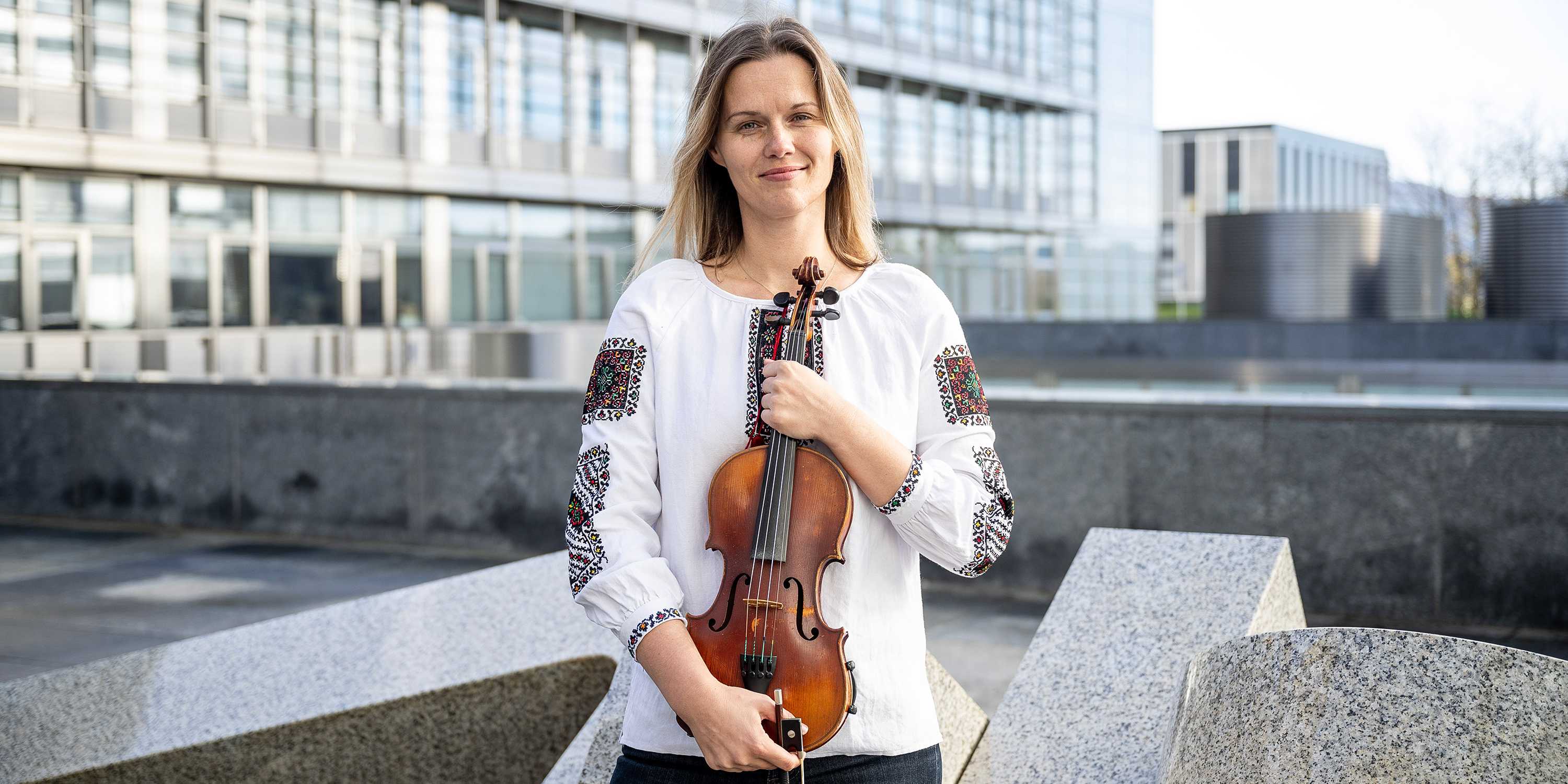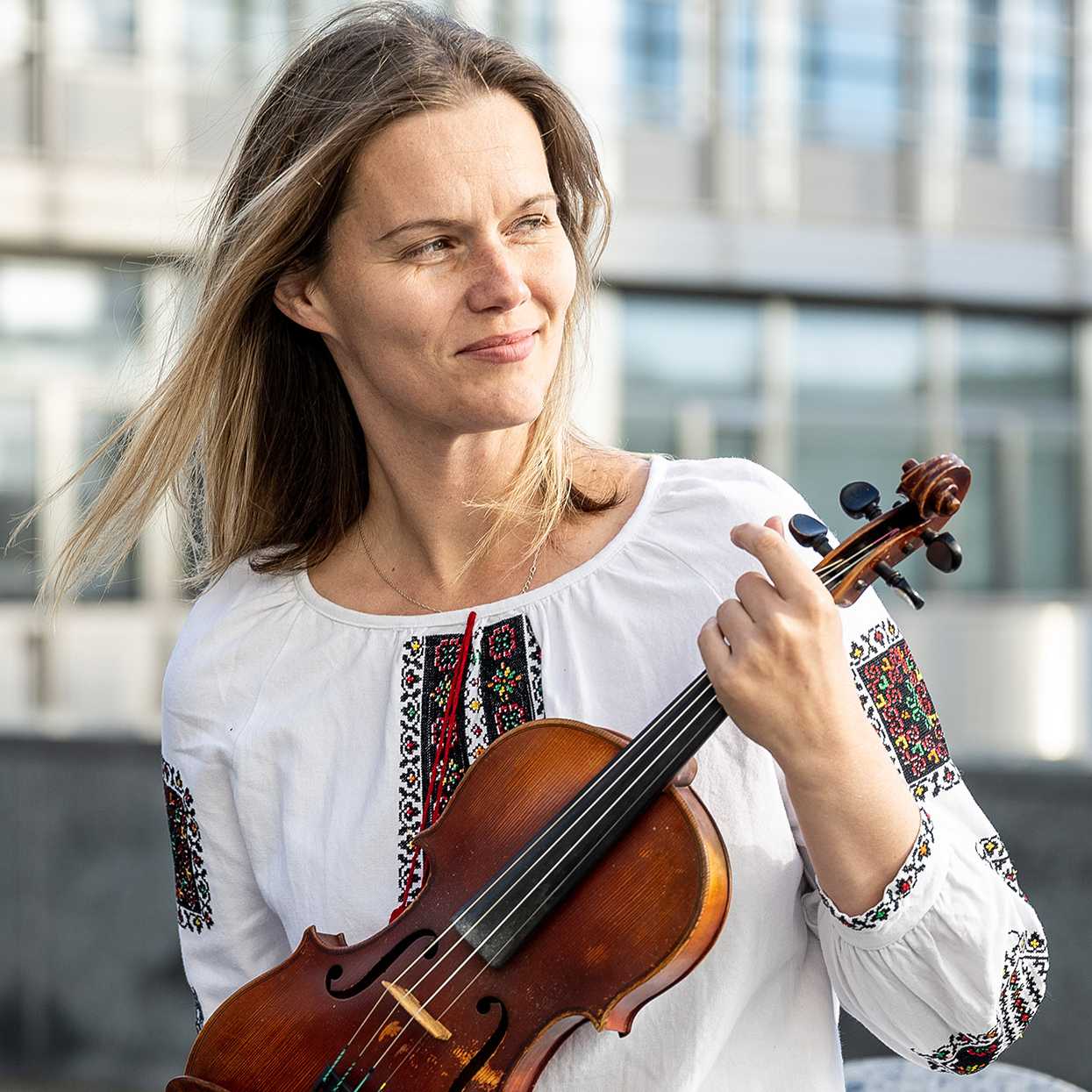Vira Bondar is fascinated by the fundamental questions of physics. She conducts research with ultracold neutrons and is working to make exercise sessions at ETH Zurich even more exciting.

'You have to irradiate a love of physics; that’s how to get students excited, also about difficult topics,' says Vira Bondar, particle physicist. And that’s why she wants physics at ETH Zurich to be taught with enthusiasm – even by those who aren’t born educators. Together with Jonas Nuber and Manuel Zeyen, who also work in the research group led by ETH physics professor Klaus Kirch, and with Guillaume Schiltz, Educational Developer at the Department of Physics, Bondar launched the Engaging Physics Tutoring hub – EPT-hub for short – about two years ago. The hub helps teaching assistants (TAs) at the Department of Physics in preparing exercise sessions and shows them how to convey the sometimes dry material in a way that makes it relevant to everyday life.
TAs are the closest contact for students
TAs play an important role in ETH teaching that is frequently not given its due. Being the closest contact for the students, they lead the exercise sessions in which the students take what they have learned in the lecture and apply it in practice. Since TAs are usually already very busy with their research projects as doctoral students, this additional obligation is often a great burden on them – especially if they don’t simply want to work through the given exercises with the students, but want to use vivid examples in teaching the material so that the students retain it.
This is exactly where Bondar comes in with the EPT-hub. The hub’s website offers supplementary materials that assistants can use in their sessions. Some of these materials were developed by TAs themselves as they tried to make the lessons more enjoyable. 'Now we’re making them available to others so that the knowledge that already exists isn’t lost,” Bondar explains. Members of the EPT-hub can also attend short training sessions where they receive teaching tips and advice. “We intentionally keep these sessions short so that people actually attend them,' she adds.
Bondar deliberately designs the hub activities to be voluntary. Whether or not a TA wants to participate in the hub is up to them. 'You can’t earn any credit points for participation,' she points out. 'Still, many people do participate; apparently they find what we offer helpful.' The benefits for TAs go beyond leading the exercise sessions: Bondar says the hub training 'teaches skills that the assistants can also put to good use in their future careers. How to inspire people, how to create and give a successful presentation – these are the kinds of skills they learn with us.'
A community emerges
Bondar is especially happy about the hub’s summer camp, where the TAs get together for a few days. 'We held the camp for the first time this year and it had this fantastic atmosphere,' Bondar says enthusiastically. 'Over that short space of time, a community was formed that now supports its members during the semester.'
Bondar has a knack for bringing people together with her emotional energy, and she loves to impart knowledge. Even as a child, she played at being a teacher and taught her younger siblings, as she recalls with a laugh. Now she wants to spread the word of the EPT-hub outside the physics department.

“As I see it, physicists explore the world at its deepest, most fundamental level, on which everything else is built. That’s what I like about this field.”Vira Bondar
How neutral are neutrons?
However, Bondar didn’t actually come to ETH Zurich for the teaching. She first became acquainted with the university in 2015 as part of an Excellence Scholarship. As a postdoc in Kirch’s group, she is now collaborating on a major experiment being conducted at the Paul Scherrer Institute. In this experiment, researchers are studying the electrical properties of ultracold neutrons. Unlike 'normal' neutrons, ultracold neutrons can be trapped for longer periods of time, making them easier to study.
Neutrons are generally considered to be electrically neutral. But it may be that upon closer inspection, they have an internal charge distribution after all, creating an electric dipole. To prove this, the ultracold neutrons must be stored in the experimental chamber shielded from any magnetic disturbances. 'Our group at ETH Zurich developed an important subsystem for this experiment, which consists of 55 kilometres of cable and can actively compensate for changes in the surrounding magnetic field,' Bondar says.
These experiments are not just about some curious property of these particles. 'Ultimately, our research can shied light on fundamental question of why the Big Bang didn’t produce equal amounts of matter and anti-matter,' Bondar explains. 'The standard model of particle physics is very successful, but it just can’t explain this imbalance in the universe. From our experiments, we hope to get an inkling as to why that is.'
Particle physics at family gatherings
'As I see it, physicists explore the world at its deepest, most fundamental level, on which everything else is built,' Bondar says. 'That’s what I like about this field.' Her fascination with physics runs in the family: 'So many of my relatives are physicists, it sometimes makes family gatherings a bit boring,' she says with a laugh. Her grandfather in particular, a nuclear physicist, inspired her when she was still only a child.
Despite this biographical history, she hesitated before beginning her studies, wondering whether she should really choose this subject. 'I had to decide whether to be a musician or a physicist,' says Bondar, a passionate violinist. 'I ultimately decided to go into physics because I thought that as a musician, I probably wouldn’t find my way back to physics.'
Nevertheless, she hasn’t let go of music completely and still plays the violin at a high level, even if not as often as she’d like. 'The violin is a challenging instrument that offers a lot of freedom. I’ve even played hard rock with it,' Bondar says. 'For me, it is the queen of instruments because it moves me the most in an emotional sense. When I’m sad, I play the violin, and then I immediately feel better.'
People are the key
Although she’s been living in Western Europe for a long time, Bondar is a native of Ukraine, and the outbreak of war in her homeland changed her life as well. 'It was especially difficult in the beginning,' she recalls. 'We who were safe here in Switzerland felt guilty somehow. It took some time to get past that.' Most of her family was able to flee to other countries, and her grandfather now lives in Switzerland too.
Bondar is impressed by ETH Zurich’s making such a strong commitment to the people of Ukraine. Even though the situation is still very difficult, she can be glad that, because of the crisis, she’s been able to meet other researchers from her home country who are also working here at ETH.
The difficult situation at home also made her aware of how important relationships with other people are. 'People are ultimately the key to everything – not just in private life or in teaching, but also in the study of neutrons,' she says. 'That’s why I’m so happy that we have really great teamwork in our research group and we support each other on a day-to-day basis.'